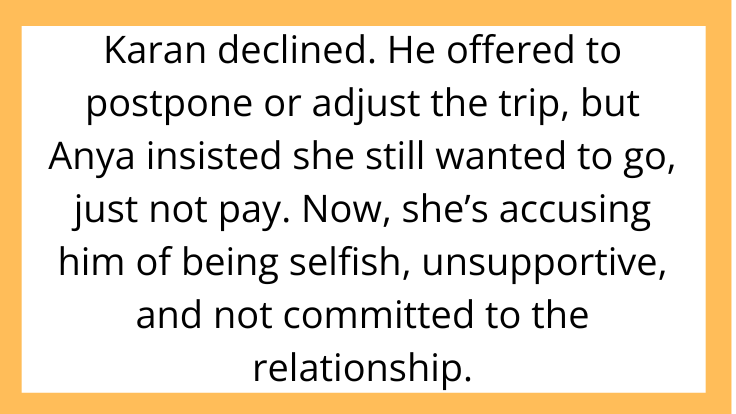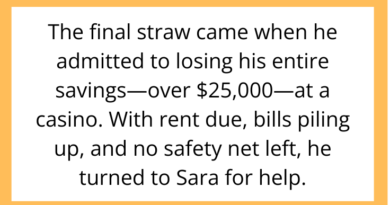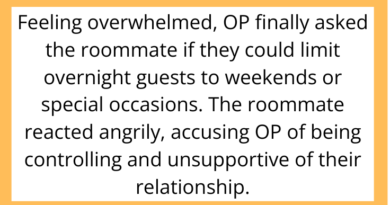AITAH for Not Paying for My Girlfriend’s Portion of the Vacation After She Quit Her Job to Travel with Me?
Vacations are supposed to bring people closer together—but sometimes, they reveal cracks in a relationship. In this AITAH scenario, we unpack a dilemma that combines love, money, and expectations: Should you be financially responsible for your partner’s choices?
Let’s break down the full story that has Reddit debating who’s truly in the wrong.
The Setup: A Dream Vacation Turns Sour

A 28-year-old man—let’s call him Karan—shared on r/AITAH that he had planned a three-week international vacation with his girlfriend, Anya, 27. Both had been working full-time jobs and were looking forward to taking a long-overdue break from the 9-to-5 grind.
Two months before the trip, Anya decided to quit her job. She claimed the work environment was toxic and said she wanted to “focus on living life.” Karan supported her decision emotionally, but was surprised when she then asked him to cover her half of the upcoming trip—flights, lodging, and daily expenses included.
“I thought she’d use her savings,” he wrote. “But she said she wants to experience the trip without worrying about money—and that since I’m still employed, I should be able to cover both of us.”
Karan declined. He offered to postpone or adjust the trip, but Anya insisted she still wanted to go, just not pay. Now, she’s accusing him of being selfish, unsupportive, and not committed to the relationship.
He asked Reddit: AITAH for refusing to pay her share?
Financial Independence in Relationships: Where’s the Line?

Karan’s Side: Fairness and Planning Matter
Karan’s frustration is understandable. The vacation was planned while both partners were employed, with an assumed 50/50 financial split. He didn’t expect to shoulder the entire burden—especially not after Anya voluntarily quit her job without discussing the financial implications in advance.
This wasn’t a case of unexpected hardship or medical emergency. It was a lifestyle choice—one Karan wasn’t financially or emotionally prepared to fund.
He’s not refusing to help his partner out of spite. He simply believes in financial boundaries and fairness.
Anya’s Side: Partnership Means Support
From Anya’s perspective, she expected emotional and financial support from the person she’s building a life with. She may feel that money shouldn’t come between them—especially on a trip that symbolizes freedom, adventure, and reconnection.
She likely sees Karan’s refusal as transactional: if he really cared, wouldn’t he want her to enjoy the experience stress-free? Isn’t that what partners do—support each other when one is down?
To her, his “no” feels like a lack of commitment.
Reddit Weighs In: Empathy with Limits

The AITAH community had plenty to say—and the majority sided with Karan.
Top comments emphasized that quitting your job for personal reasons doesn’t entitle you to someone else’s money, especially if you make plans with shared costs in mind.
One user wrote:
“She made an adult decision to leave her job. It’s not on you to foot the bill for her vacation just because you’re still working.”
Another noted:
“Supporting your partner emotionally isn’t the same as financially enabling irresponsible behavior.”
However, others urged Karan to explore why Anya made her decision. Was it burnout? A mental health crisis? If so, perhaps compassion should factor into his decision-making—even if the final answer is still no.
Key Takeaways: Support vs. Sacrifice

This scenario raises bigger questions every couple faces at some point:
-
What’s the balance between emotional and financial support?
-
Is love about equality—or about showing up no matter what?
-
Where do you draw the line between enabling and supporting?
Karan isn’t necessarily wrong for saying no. But neither is Anya evil for wanting support. The real issue is a lack of aligned expectations and communication.
Relationship Advice: How to Handle Financial Imbalance

If you’re facing a similar situation, consider the following:
1. Talk Early, Talk Often
Discuss financial roles and responsibilities well before any joint plans—especially big ones like travel, moving in, or quitting jobs.
2. Separate Finances Are Healthy
It’s okay to have individual budgets, even in a relationship. Joint goals don’t mean joint bank accounts—unless you both agree.
3. Support ≠ Sacrifice
You can be a supportive partner without compromising your own financial security. Boundaries are not the opposite of love—they’re a form of it.
Final Verdict: Not the Villain—But the Relationship Needs a Reset

Karan isn’t the villain for refusing to pay for his girlfriend’s trip. In fact, most would say he’s being financially responsible and realistic. But this situation signals a deeper issue: the couple may have different ideas about partnership, money, and independence.
Before booking flights or packing bags, they might need to sit down for an honest conversation about values, expectations, and the future.



